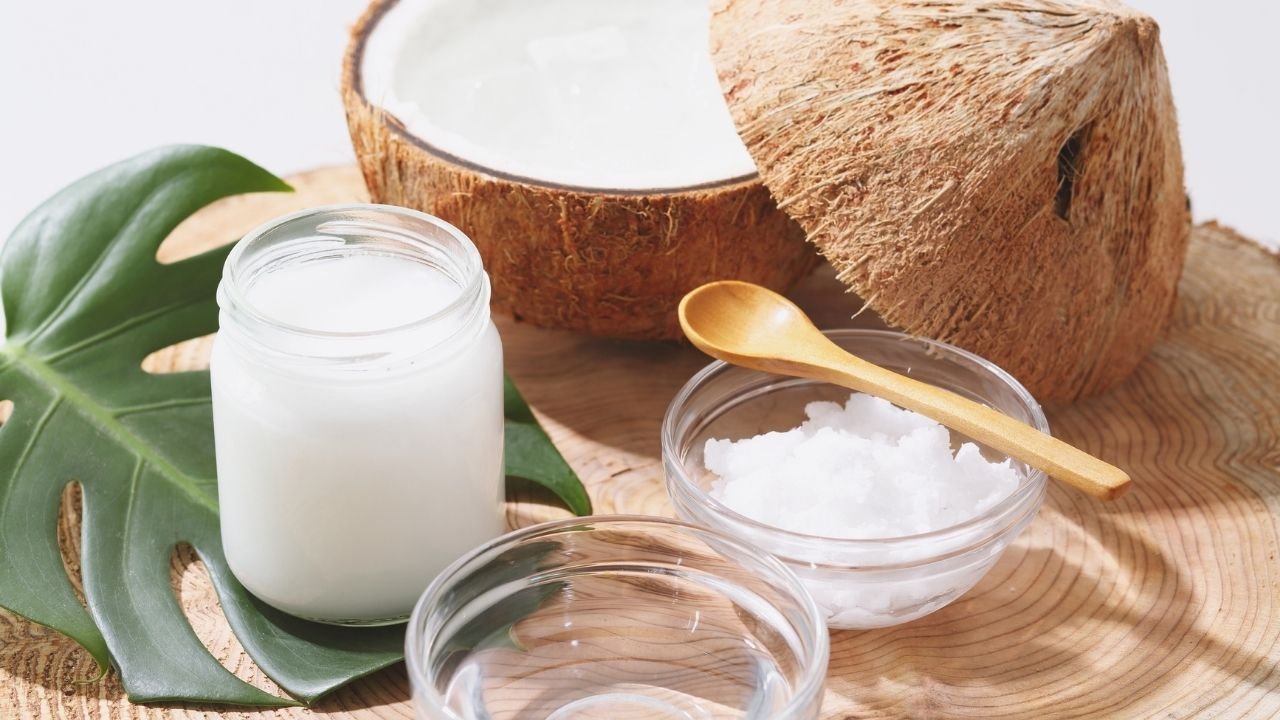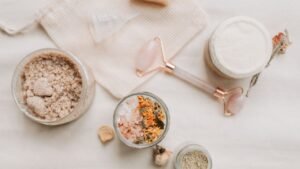As someone with long, thick, and lustrous hair, I am often asked about my hair care routine. And my usual answer is “hair oiling”. But then comes the line of follow-up questions. Today, I am answering all of them. Let’s go!
Your hair is an integral part of your personality. Healthy and good-looking hair can take your personality from zero to hero very quickly. And hair oiling is the root of it all.
Let’s talk about 13 Indian hair oiling secrets for you to try and experiment on your hair to get the look you deserve, too.
Why is Hair Oiling Important in Indian Tradition?
Oiling your hair has been a significant part of the Indian tradition since ancient times. It has been a practice passed on from generation to generation. In Indian tradition, they follow one of the best ayurvedic practices that promotes hair growth.
Hair oiling is also the perfect self care practice to rejuvenate your mind and body. It nourishes and moisturises the roots of your hair, reduces dryness, and makes your hair thick and shiny.
Applying oil on your hair and scalp improves blood circulation. It also brings a meditative feel and relaxes your head and mind. It’s also believed to activate the seventh chakra, known as the crown chakra, which connects with the pineal gland, known to calm the mind.
Thus, a hair oiling routine should be an essential part of your lifestyle.
But the truth is that despite the above benefits, the modern lifestyle has changed the way we care for our hair.
Many people are attracted to chemically-fueled practices such as hair colouring, drying, dyeing, and keratin treatment because of the beauty standards set by society.
Not only do these practices damage your hair, but they also lead to hair health issues sometimes.
To protect your hair from the aftereffects of the above methods, and to get healthy and shiny hair, let’s explore 13 crucial Indian hair oiling tips that can transform your hair care game.
13 Essential Indian Hair Oiling Secrets Every Girl Should Know
1. Choosing the Right Hair Oil:
Lately, so many hair oils have flooded the market, with hair care being a billion-dollar industry. It’s quite easy for you to feel overwhelmed.
While the options are plenty, choosing the right hair oil may seem like a daunting task at times.
But choosing the right one could be the first step in achieving healthier hair. To choose the right hair oil one you must be aware of the nature of the oil and the key ingredients in each type of oil.
Some of the oils that are used in Indian practice and their benefits are listed below.
a. Coconut oil:
This is the oil that started my journey with hair care. The versatility of coconut oil makes it perfect for all hair types.
- It can moisturise your hair well and prevent damage.
- It has an essential fatty acid called lauric acid, which is known to improve hair health.
- It also reduces protein loss from hair.
- It has antimicrobial properties that reduce dandruff.
The environmental factors, like wind, sun, dust, and smoke, can cause damage to your hair. Coconut oil is effective in protecting your hair against any such damage.
With its sun protection factor of 8, it is quite effective against sun damage.
b. Castor Oil:
Castor oil is rich in omega-6 and omega-9 fatty acids. It nourishes your hair and fights dandruff. It prevents tangling and dryness of hair.
Oiling your scalp with castor oil can deeply nourish your hair follicles and lead to genuine hair growth.
Castor oil is a natural conditioner. Thus, it keeps the hair soft, healthy, and shiny.
It is perfect for you if you have dry hair.
c. Amla oil:
Amla oil is rich in Vitamin E, Vitamin C, and antioxidants. They help with cell regeneration. It’s also known to improve circulation in the blood vessels of the scalp region.
My mom has used amla oil all her life, and she used it on my hair as a child. Amla oil was a huge part of my hair oiling routine, which is why it deserves the rightful appreciation for the thick and lustrous hair I have.
It’s a good moisturiser for your hair. It can reduce inflammation, regulate oil production, and hydrate the scalp region.
This oil is rich in phytonutrients, minerals, and vitamins. Using it regularly can shine, strengthen, and support your hair. This oil could be an ideal match if you have an oily scalp with dry hair.
d. Almond Oil:
Almond oil is rich in omega-9 fatty acids, Vitamin E, and high levels of protein. This can bring a smooth and shiny look to your hair.
Its lubrication improves hair resilience, which prevents hair damage and split ends. It is also effective in the treatment of scalp psoriasis and flaky scalp.
e. Brahmi Oil:
Brahmi oil possesses a compound that is known to improve blood circulation on your scalp.
It can reduce hair loss and prevent premature greying of your hair. The amazing benefit of brahmi oil goes beyond hair care. It’s known to reduce stress and improve sleep. Applying it every night results in better sleep.
Choosing the right hair oil is important. You must base it on the nature of your hair and scalp. It’s a hair oiling secret everyone must know.
2. Warming Up the Hair Oil:
So right after you have chosen your preferred hair oil, make sure you warm it before applying to your head. Applying warm oil increases the absorption of oil in your scalp and shaft and nourishes them deeply.
It can help to increase blood circulation, which promotes hair growth and helps you to have healthy hair. Applying warm oil to your head is soothing and relaxing. It reduces your stress and tension.
Don’t overheat the oil, as it may cause loss of essential nutrients in the oil.
3. Massaging Your Hair With Oil:
Massaging your hair with oil can strengthen your hair shaft and prevent hair fall. It helps the hair roots absorb nutrients.
The fatty acid in the oil can help to replace lipids in the hair, which might have been damaged due to chemical treatments.
Oil massage helps to prevent dandruff, reduces split ends, and frizzy hair on your head.
Always massage your hair scalp in a circular motion, covering the entire head. This will help boost blood circulation and relieve stress in your body.
You don’t need to massage your hair every day. It can be done once or twice a week for better results. If you want to use a scalp massager, be sure to use it gently on your head.
4. Infusing Herbs in Your Oil:
The application of pure coconut oil, castor oil, and almond oil can bring serious hair growth. But the ancient Ayurveda has the practice of using infused herbal oils that prove to be more beneficial to your hair.
The antioxidants, vitamins, and minerals from the herbs will mix with the oil to create more effective hair growth.
While any type of oil can be used as a carrier oil for herb infusions, it’s generally recommended to use coconut oil and olive oil because of their longer shelf life.
Here are a few more for your recommendations:
- Hibiscus-infused hair oil: It prevents hair loss and dandruff, resulting in shiny hair. Also, it promotes hair regrowth.
- Bhringraj Hair Oil: It is effective in preventing hair fall and can treat premature greying of the hair.
- Kalonji Oil: Kalonji contains compounds like nigellone and thymoquinone that boost hair growth and cut scalp inflammation.
- Vetiver Oil: Vetiver is an aromatic root. The oil infused with vetiver has strong antimicrobial properties. This helps to treat scalp problems like dandruff, itching, and inflammation.
- Ratanjot oil: Ratanjot-infused oil is traditionally used to treat greying, baldness, and hair loss. This oil also has powerful antimicrobial properties.
5. Customize your blend:
Though herbal oil infusions are quite beneficial for your hair, always customise your hair oil blend.
There are many infusion options available when it comes to hair oil. For example:
- Amla, curry leaves, camphor,
- Hibiscus flowers, cooked in coconut oil.
- Onion juice, coconut oil
These are traditional blends that promote dark and thick hair growth.
If you get fungal infections on your head, avoid coconut oil. Instead, use neem, dhurdhurapatradi, or karanj oil to reduce head itching.
The mix of ayurvedic herbs, like hibiscus, amalaki, bhringraj, or brahmi, infused into the oil can boost benefits. It can thicken hair, aid growth, and add antimicrobial properties.

6. Choose the Oil Based on the Season:
While there are so many varieties of hair oil available to apply to your hair, choosing the right hair oil based on the season is very important.
This will prevent your hair from unwanted damage occurring due to natural elements. Use sesame oil to take care of your hair during the winter months. Use coconut, castor, and almond oils for your summer hair care routine.
7. Overnight Oil Treatment:
I have been doing this since forever, and if there’s one haircare tip I can give you to follow blindly, it’s this.
If you want to deeply nourish your hair, then overnight oil treatment should be your holy grail. Leaving the oil overnight can increase absorption and deeply moisturise your hair.
This can bring you healthy and shiny hair. Avoid this treatment if you have any serious sinus issues.
Always cover your head with a towel after applying oil at night. When you sleep, let the oil work on your hair to do its magic.
8. Rinsing Your Hair:
Whether you have applied oil overnight or a few hours before washing, rinsing your hair properly can help you get the full benefits of hair oiling.
Using mild warm water for washing your hair can prevent hair damage.
The usage of shampoo plays a vital role in hair washing. So, make sure you choose a mild shampoo, without sulphate as they can take away your hair’s natural oil.
Use enough water to cleanse your hair and remove any excess oil.
9. Establish a Consistent Hair Oiling Routine:
If you want to harness the real benefits of hair oiling, be consistent with your routine of applying oil. I apply my hair oil once a week due to my busy schedule. However, if you can do it twice, you can expect better results.
With this consistency, you can ensure proper nourishment for the hair. If you can’t keep the oil overnight, apply it in the morning. Keep it for at least 50 to 60 minutes and then rinse your hair.
10. Protect Your Hair:
Your hair, like your body, needs protection from the sun’s UV rays and other pollutants.
This will help to maximise the benefits of hair oiling practice. If possible, wear a hat or scarf while going outside during extreme weather conditions.
Don’t overdo hair treatments. Hair treatments like hair straightening and colouring weaken your hair follicles, which ultimately leads to weak and unattractive hair.
11. Don’t Overload on Oil:
While oiling your hair is essential for maintaining its health, it’s crucial not to overdo it. Excess oil can weigh down your hair, lead to greasiness, and attract dirt and pollutants.
Find the right balance by applying a moderate amount of oil and adjusting the frequency of hair oiling based on your hair’s needs.
Apply oil when your hair is dust and pollutant-free.
12. Eat right for healthier hair:
External application of oil in the right way can do wonders for your hair. But maintaining a healthy eating habit is essential for even stronger hair.
Foods rich in minerals, vitamins, and proteins are vital for hair growth. Eat foods like leafy greens, eggs, seeds, nuts, and fish. They help hair grow and make it stronger.
A nutritious diet complements your hair oiling routine and enhances the overall health of your hair.
13. Listen to Your Hair
Lastly, listen to your hair and understand what it needs. Pay attention to how your hair responds to different oils, treatments, and hair care routines.
For example, based on all the experiments I have done on my hair, I know that using too many hair tools brings hell upon my hair health. Thus, I only do it when it is extremely required. Otherwise, I like to style my hair naturally or with braids.
So, listen to your hair. Tailor your hair care regimen based on your hair type, concerns, and preferences.
By listening to your hair, you can make informed decisions that will lead to healthier, happier hair in the long run.

Conclusion:
Hair oiling is more than making your hair beautiful and healthy. It’s a wonderful way to rejuvenate your body and mind. It deeply nourishes your hair roots and makes your hair stay stronger.
From choosing the right hair oil to massaging your scalp, the Indian hair oiling method involves a proper hair care routine for healthy, thick, and shiny hair.
If you are someone who loves beautiful hair, start implementing the above hair oiling method in your hair care routine and stay consistent with what you do for your hair to see visible results.
FAQs
1. Is hair oiling good for hair?
Yes, hair oiling is a time-tested practice that nourishes your scalp, strengthens hair strands, and improves your overall hair health. Oils provide essential fatty acids, vitamins, and antioxidants that hydrate the scalp and reduce dryness, breakage, and split ends. Regular oiling can also stimulate blood circulation, encouraging hair growth and a healthier scalp environment.
2. How often should I be oiling my hair?
It depends on your hair type and lifestyle. For most people, oiling 1–2 times a week is ideal. If you have dry or curly hair, you may benefit from more frequent oiling. On the other hand, those with an oily scalp or very fine hair might oil just once a week or even once every two weeks. Listen to your hair because consistency matters more than frequency.
3. What are the disadvantages of oil on hair?
While hair oiling is beneficial, overdoing it or not washing it out properly can lead to:
- Product buildup on the scalp
- Greasy, limp hair
- Clogged hair follicles (if the scalp isn’t cleansed properly)
- Attraction of dirt and pollution
- Hair fall during aggressive oil removal
To avoid this, always oil moderately and wash your hair thoroughly.
4. Is 30 minutes of oiling enough?
Yes, 30 minutes of hair oiling is often enough to allow your scalp to absorb nutrients. If you’re short on time, a light massage with warm oil for 30-45 minutes before shampooing can still give your hair a decent boost. However, for deep conditioning, keeping the oil on overnight can be more effective, just make sure to protect your pillowcase.
5. Which hair oil not to use?
Avoid mineral oils, heavily perfumed oils, or hair oils with artificial ingredients and preservatives. These can cause buildup and irritation. Instead, choose natural, cold-pressed oils like coconut, almond, jojoba, or castor oil. Also, avoid using essential oils directly on your scalp without diluting them in a carrier oil.
6. Can I sleep with oil in my hair?
Yes, you can. In fact, leaving oil overnight allows your scalp and hair to absorb nutrients deeply. However, don’t go overboard with the quantity; a few teaspoons massaged gently into the scalp is enough. Cover your pillow with a towel or use a soft cotton cap to avoid staining. Always wash it out the next morning to avoid buildup.



